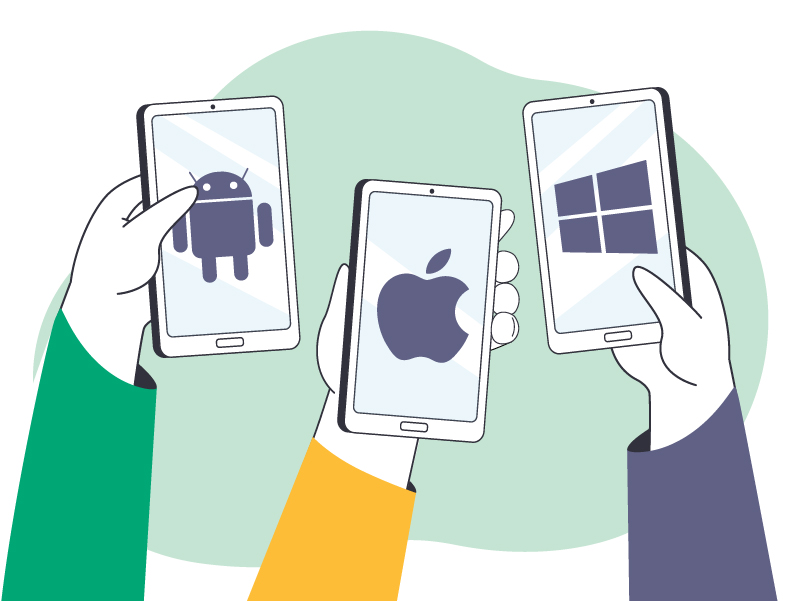All apps are the same, right? Not really. In the realm of mobile apps, you can often hear terms like a native app, a hybrid app, and a cross-platform app. Both of these are mobile apps but by no means they are the same.
While there are some significant differences between a native and a cross-platform app, in this post we will focus on the native mobile app development. Here’s what we will cover:
- Definition of native mobile app development.
- Differences between native and hybrid app development.
- The benefits of native mobile apps.
- Best ways for hiring native mobile developers.
Let’s get started!
Native app development? That’s us. Let’s talk about your project.
What is Native App Development?
Native app development is the process of building a mobile app exclusively for one target platform (operating system). The applications are developed using programming languages and tools that are dedicated to a single platform only. For example, native Android apps are developed with Java or Kotlin, while iOS apps with Swift and Objective-C. In other words, the same exact codebase produced during the development cannot be reused to build an app for another platform.
We mentioned that the process of native mobile app development involves not only platform-specific languages but also tools. Both Apple and Google provide software developers with their own development tools, interface elements, and SDK (Software Development Kit). Those toolkits help developers build and test applications in a native environment and ensure the app has access to system and hardware features (e.g., sensors, push notifications) without any workarounds.
Native App Development vs Hybrid Development
Since the native apps run on a specific technological stack dedicated to either the Android or iOS platform, the very process of the mobile app development for both of these platforms requires different approaches.
Programming languages
To build a native iOS app, a developer would need to produce a codebase in either Swift or Objective-C and compile it using Xcode. Whereas a native Android application would require code written in Kotlin or Java compiled using Android Studio. So the bottom line is that developing native apps for both platforms requires two separate codebases compiled in two separate IDEs (Integrated Development Environment).
Hybrid mobile app development, on the other hand, differs significantly in this regard. When developers create cross-platform mobile apps, they produce one codebase that is compatible with both mobile platforms. It means they write the code once and then they can run it anywhere. For that, they use frameworks like React Native, Xamarin, or Flutter to code apps that can be deployed on both Android and iOS.
Cost and time-effectiveness
Cross-platform development saves time and money because there is no need for two development teams dedicated to each platform. On the other, you risk sacrificing quality in the process. It is difficult to tailor an app that runs as optimally on various platforms as the native one. Moreover, a cross-platform mobile app will need an additional abstraction layer when running which could result in lower performance. And although cross-platform mobile apps are gradually becoming more native-like, they are not fully on par with the native ones yet.
Development skills and experience
In order to develop a cross-platform app, developers should have some experience with native development for at least one of the platforms. This is mainly due to the fact that Android and iOS apps follow their individual development and design guidelines. Those guidelines are to ensure that each app is coherent in style and provides the best UX.
Cross-platform developers also need to have experience with other important stages in the mobile app development process such as quality assurance or deployment. Specifically, the configuration of CI (Continuous Integration) for Android and/or iOS. Then, sending app build through deployment platforms like FireBase App Distribution. And finally, sending the app build to the production stage on Google Play or Apple App Store respectively.
All of these factors call for a separate setup for each platform which could be quite a challenge for someone without a strong background in native app development. Therefore, cross-platform development, albeit sounding like a cost-effective shortcut, requires a range of skills that go beyond knowing a hybrid mobile app framework or a language associated with it.
Do you have a project for us? Let us build your next product! Share your idea or request a free consultation with our experts.
Native App Development: Benefits
Many companies invest in native mobile app development because of the benefits offered in comparison to other types of apps (hybrid or web).
1. Better Security
Data breaches can negatively affect the brand’s reputation and drive consumers away. Luckily, there are plenty of security measures available in native apps. Some of these include user authorization methods like biometrics and two-factor authentication (2FA) which you can quickly implement through device-native functions (like Apple’s Face ID) or third-party tools (like Authy).
Native apps can also utilize SSL certificate pinning (the process of associating a host with its certificate or public key). This method is more effective at preventing man-in-the-middle (MITM) attacks than the SSL certificates which you can find in web browsers and hybrid apps.
App security also comes in the forms of critical system fixes and updates. Native apps are the first ones to receive the newest SDKs. Cross-platform tools, on the other hand, often need to support those updates before developers can use them in their apps. This, in turn, sets the non-updated hybrid apps at risk of introducing bugs and vulnerabilities. For that reason, native mobile apps are more secure than the cross-platform ones.
2. Familiar Appearance
Native mobile apps are developed with the use of native SDKs. Thanks to this, developers can maintain a consistent look for mobile apps with their platform. The huge benefit is that the native mobile app looks and feels familiar to the user who is used to Android or iOS products. Consequently, such a platform-wise coherence of apps ensures a better UX.
Related reading: Designing for iPhone X: What has changed?
3. Higher Performance
Since native mobile applications have full and undisturbed access to the hardware and the operating system’s features, they are faster, have better graphics support, higher frame rate and overall efficiency. In comparison, non-native apps do not have such an easy or direct access (if at all). On top of that, hybrid and cross-platform frameworks add one or more intermediate layers which make non-native apps inherently slower than native solutions.
4. Easier Development
As much as the “write once and deploy everywhere” development approach can be alluring, do not forget that cross-platform solutions are not fully native. They still require some tweaks and workarounds to make each app version suit their respective platforms. Such a situation makes plenty of room for introducing human errors into the hybrid app.
Also, native platforms have their nuances. And it is those nuances that the hybrid code must account for which is not always easy or even possible. It could be solved by finding a solution that would work for both platforms (which could take months). Or by writing a piece of code (often in a native language) to support both platforms in the same codebase. As a result, mobile app developers end up maintaining two different applications in one codebase (which is more difficult than mainintaining two separate codebases for two applications).
5. Offline Work
Native apps work efficiently without the Internet connection because all of their content is downloaded during the installation and operation process. They also come with rich in-browser caching features that make all cached resources available in offline mode.
6. More Cost-Effective
If we talk about short term benefits, then the hybrid approach typically starts out great. That is due to the fact that is it much easier to hire web developers who could learn cross-platform or hybrid frameworks to develop a mobile app. The process of development is relatively fast, especially if you consider one codebase fot two apps. But in the long run, there are many hidden costs that many realize only after the mobile app development process is already in advanced phases.
Hybrid and cross-platform frameworks are not 100% native. It means that anything they cannot support will need to be developed separately which costs time (and time is money). It also causes delays which put non-native application at security nad performance risks. So while the initial cost od developing native apps is usually higher than of the non-natives apps, in the long term perspective, native apps will cost you less.
Not to mention that if an app is not fully compatible with the newest operating system features, or it does not look and feel like native, users will not be happy about using it.
Examples of Native Apps
There is a huge selection of native mobile apps in the marketplace. So you can expect the following examples to cover a wide range of app categories, from messaging services, games, navigation to business applications.
- Spotify
- PokemonGO
- Waze
- Tesla
- Duolingo
- Microsoft Office
Finding Native App Developers
If you look at Apple AppStore and Google Play Store, you will notice thousands of apps that cater for a variety of audiences and needs. But it was not Apple or Google that developed them. They were built by third-party developers on their own or as part of a team hired by a company.
If you want your mobile app to be native, then you can build an in-house team who will develop and maintain your application. Or, you can outsource it to a third-party company. What’s the difference? The offshore software development companies already have dedicated software development teams with the required experience and expertise so you do not have to hire them individually. And secondly, the cost of custom mobile app development is going to be much lower, especially if you want to hire locally from Australia, Canada, the US, or Western Europe.
Related reading:
Summary
Native development is an excellent choice if you want to build a great-looking, secure, and stable mobile app that will work flawlessly on the Android or iOS platform. If you would like to develop a native app we are always happy to share our expertise and over 10 years of experience in the software development field. Contact us so we can get to know your business and a vision for your app better. Our experts will also clarify all your doubts related to the hiring and development process.



